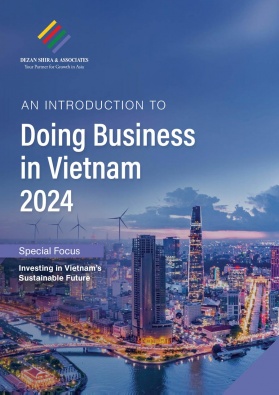EuroCham Vietnam’s Business Confidence Index for Q2 2024
The European Chamber of Commerce in Vietnam (EuroCham) recently released its Q2 2024 Business Confidence Index (BCI) report, reflecting a generally positive sentiment among European businesses towards Vietnam’s market. However, the report also highlights the need for further policy and regulatory improvements to enhance the country’s business landscape.
The Business Confidence Index (BCI) survey is emailed quarterly to business leaders from over 1,400 EuroCham members. Among those invited for Q2 2024, 212 business leaders completed the questionnaire, representing a 9.5 percent response rate, which is moderately high for this group.
Introduced in 2011, the BCI report serves as a real-time barometer of the evolving business environment of Vietnam, particularly useful as it is among Southeast Asia’s most dynamic markets.
EuroCham uses the insights from the BCI survey to engage in dialogue with both Vietnamese officials and EU policymakers, aiming to identify key growth areas and strengthen Europe-Vietnam partnerships.
Business confidence in Vietnam
Current business sentiment
The BCI index dipped slightly to 51.3 in Q2 from 52.8 in Q1 2024. Nevertheless, overall sentiment remains positive, with 68 percent of respondents expressing a neutral to positive view of current Vietnam business conditions. However, 13 percent fear economic deterioration in the next three months, up from 10 percent in the previous quarter.
Despite the overall assessment showing minimal change from Q1 2024, researchers have issued a caution, as it comes after several quarters of a constant upward trend. This might signal a potential slowdown requiring a more cautious business outlook in upcoming quarters.
Individual businesses are also more hesitant about their quarter-on-quarter prospects, with 45 percent remaining neutral and 23 percent expressing concerns.
Additionally, the BCI report findings indicate that Vietnam’s economic recovery is tentative. While consumer spending and business activity show signs of improvement, the recovery is uneven. Mixed signals and lingering uncertainties prompt businesses to remain cautious.
For example, 53 percent of the firms that offered a positive assessment cited favorable market conditions as influencing their upbeat perceptions. These conditions included improvements in consumer spending, service demand, trade activities, and industry trends. In contrast, 63 percent of respondents who adopted a negative assessment pointed to weak domestic and export demand, as well as other global economic factors.
Short-term outlook for Q3 2024
Thue Quist Thomasen, CEO of Decision Lab, revealed a nuanced picture of Vietnam’s business landscape in the latest results. Thomasen noted that firms are slightly more cautious about the short-term business conditions, necessitating timely solutions to sustain the previous positive trend.
Key findings
Procedural delays: Many businesses face delays at the central government level and in obtaining local permits.
Optimistic outlook: 31 percent of business leaders are optimistic about the next three months, driven by strong development in the private sectors, particularly retail channels and private hospitals.
Neutral perspective: 45 percent of respondents, who chose to be neutral, cited regulatory challenges as their primary concern. They seek clear visibility and stable policies to implement long-term investments but have not observed positive signals so far.
Negative outlook: A notable 23 percent of respondents reported a negative outlook for the next quarter. This group cited various causes, including cash shortages, increased borrowing, and no imminent improvement in tax authority and central bank regulations, which are necessary to create favorable conditions for FDI businesses.
Overall, while there is some optimism in specific sectors, the broader business environment is characterized by caution and concerns about regulatory stability and procedural efficiency.
Long-term outlook for the next five years
In contrast to short-term caution, the robust GDP growth of 6.42 percent in H1 2024 is accompanied by nearly 70 percent expressing long-term optimism, indicating “underlying confidence that may materialize in future readings,” said Thomasen.
Dominik Meichle, Chairman of EuroCham Vietnam, also expressed his confidence in a more efficient and attractive business environment that benefits both the European and Vietnamese business communities. This environment must be shaped by mutual efforts to address administrative and regulatory hurdles.
Vietnam is still a favored investment destination
The slightly tempered enthusiasm has not significantly altered business perceptions of Vietnam as a preferred investment destination. With nearly 70 percent of business leaders endorsing Vietnam as their top choice, there remains high confidence in the country’s business climate. This endorsement continues to encourage new foreign ventures into Vietnam.
Setbacks for European businesses in Vietnam
While European businesses remain optimistic about Vietnam’s potential, the BCI survey underlines persistent regulatory challenges hindering growth and investment. Key drawbacks identified include:
- Ambiguous regulations subject to varying interpretations;
- Burdensome administrative processes;
- Difficulties in obtaining licenses, permits, and approvals;
- Challenges with procuring visas and work permits for foreign workers; and
- Duplicate or inconsistent approvals across government levels.
The BCI report also highlights specific areas where regulatory hurdles are particularly pronounced:
- Work permits and visas for foreigners: Vietnam issued Decree No. 70/2023/ND-CP regarding foreign workers working in Vietnam in September 2023 to streamline work permit and visa procedures for foreign workers. Despite that effort, only 3.3 percent of respondents report significant improvements. While half acknowledge some progress, a quarter indicate no change. Further improving this process is crucial for attracting international talent and fostering knowledge exchange.
- Personal Data Protection Decree (PDPD): The recently implemented Personal Data Protection Decree (PDPD), designed to safeguard personal information, has inadvertently caused business uncertainty. A quarter of survey respondents admit to not fully understanding the decree’s requirements, and only a third feel confident in their ability to comply. This highlights the need for clearer guidance and support from authorities to ensure a smooth transition and compliance.
Solutions for securing long-term growth and FDI
Businesses surveyed in the BCI have recommended five solutions for Vietnam to improve its business environment, thereby attracting more FDI and promoting economic growth:
- Streamlining administrative and procedural processes;
- Clarifying and precision in laws to reduce arbitrary interpretation;
- Developing essential infrastructure such as roads, ports, and bridges;
- Simplifying visa and work permit procedures for foreign experts; and
- Ensuring political stability and security.
EVFTA implementation
Effective since August 1, 2020, the EU-Vietnam Free Trade Agreement (EVFTA) has significantly boosted EU-Vietnam trade relations in various ways. Despite initial confusion, businesses are increasingly confident in the EVFTA’s impacts. The proportion of businesses experiencing moderate to significant benefits from the agreement has increased by over 10 percentage points year over year, with 27 percent reporting positive effects this year compared to 18 percent last year.
The EVFTA primarily benefits businesses through:
- Tariff reductions or elimination;
- Enhanced competitiveness in the Vietnamese market;
- Expanded market access in Vietnam;
- Improved supply chain efficiency;
- Greater transparency and predictability in business operations; and
- Strengthened legal framework for conducting business.
However, firms suggest there is still room for improvement in EVFTA implementation. The top five obstacles that need prioritized attention include:
- Complex regulatory compliance requirements;
- Limited recognition and acceptance of international standards by local authorities;
- Insufficient understanding of the EVFTA;
- Issues with customs valuation for imports to Vietnam; and
- Opacity and delays in customs clearance procedures.
European firms embrace carbon neutrality progress
According to the BCI report, European businesses in Vietnam are increasingly committed to sustainability, with 7 percent having already achieved carbon neutrality. Another 37 percent have set targets to reach this goal by or before 2050, while 18 percent aim for carbon neutrality by 2030.
However, surveyed businesses have identified several key obstacles in their efforts towards achieving net-zero emissions, including:
- Customer resistance to paying premium prices for sustainable products;
- Inadequate government incentives and regulations to promote sustainability;
- Limited access to clean energy sources and effective waste management infrastructure;
- Financial constraints in implementing sustainable practices;
- Lack of employee awareness and engagement with sustainability initiatives; and
- Challenges in measuring emissions and ensuring supply chain compliance.
On a positive note, the recent signing of the Direct Power Purchase Agreement (DPPA) decree offers hope. Swift and successful implementation could address some of these challenges, particularly by improving access to clean energy sources and potentially providing better sustainability incentives.
To further tackle these challenges and promote sustainable economic practices, EuroCham Vietnam is organizing the Green Economy Forum & Exhibition (GEFE) 2024, scheduled for October 21-23 in Ho Chi Minh City. This three-day event will include conference sessions, an exhibition showcasing green technologies, and high-level plenary discussions with European and Vietnamese leaders. Its aim is to equip businesses with the knowledge, connections, and tools needed to navigate Vietnam’s evolving business landscape while promoting environmentally responsible practices.
Conclusion
The Q2 2024 BCI offers a snapshot of business sentiment among European companies in Vietnam, characterized by overall optimism tempered with caution. Looking ahead to Q3 2024, businesses should closely monitor the implementation of EVFTA, progress towards carbon neutrality, market conditions, and regulatory changes to support continued growth.
About Us
Vietnam Briefing is one of five regional publications under the Asia Briefing brand. It is supported by Dezan Shira & Associates, a pan-Asia, multi-disciplinary professional services firm that assists foreign investors throughout Asia, including through offices in Hanoi, Ho Chi Minh City, and Da Nang in Vietnam. Dezan Shira & Associates also maintains offices or has alliance partners assisting foreign investors in China, Hong Kong SAR, Indonesia, Singapore, Malaysia, Mongolia, Dubai (UAE), Japan, South Korea, Nepal, The Philippines, Sri Lanka, Thailand, Italy, Germany, Bangladesh, Australia, United States, and United Kingdom and Ireland.
For a complimentary subscription to Vietnam Briefing’s content products, please click here. For support with establishing a business in Vietnam or for assistance in analyzing and entering markets, please contact the firm at vietnam@dezshira.com or visit us at www.dezshira.com
- Previous Article Vietnam’s Economic Performance in H1 2024: Key Indicators and Growth Forecast
- Next Article Prospects for Environmental Technology Investors in Vietnam








